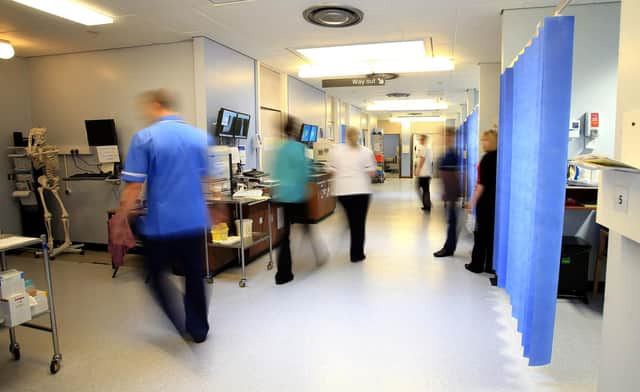Euan McColm: Why we need a Royal Commission on the future of the NHS


No political party is innocent when it comes to using the health service as either weapon or shield. None can say they have not exploited the NHS for their own ends.
Back in 2014, during the independence referendum campaign, the SNP’s Nicola Sturgeon and the Greens’ Patrick Harvie united to insist only a Yes vote would save the health service from privatisation, despite the running of the NHS being entirely devolved to Holyrood.
Advertisement
Hide AdAdvertisement
Hide AdTwo years later, Brexiteers lied that leaving the EU would mean an extra £350million investment in the NHS every week. Last week, Tory Prime Minister Rishi Sunak invited voters to judge him on NHS waiting times despite his Government appearing to have no workable plan to improve matters.
Meanwhile, Labour attacks the SNP in Scotland and the Conservatives in England for failing the service while it runs the NHS into the ground in Wales.
When it comes to responsibility for the crisis in the health service, there’s more than enough plague to ravage every political house.
It is abundantly clear the NHS, across the United Kingdom, is broken. Medical staff frequently share stories about the intolerable pressures they face while patients and their families tell of agonising delays in treatment and of being left to wait on trolleys in corridors, in ambulances, or on the floor at home because the service can no longer cope.
In the face of these reports, politicians offer us shamefully mealy-mouthed responses. Yes, they say, it’s true that things aren’t as they should be but, well, don’t forget Covid and winter flu and days with a Y in their name.
Things may be worse than ever but nobody who has paid the slightest attention to the developing problems within the NHS over recent decades can convincingly say they did not see the current crisis coming. Growing waiting lists and, thus, longer waiting times are not some surprising new development. These things have been getting increasingly problematic for years.
The political response to these issues has been woeful. During election campaign after election campaign, rival parties have engaged in reckless Dutch auctions, undercutting each other in promises to have patients seen more quickly.
In an act of uniquely awful cynicism, Scotland’s SNP government went so far as to place waiting time guarantees in statute but neglected to include any sanction for failure. The law, created in 2012, which states patients must begin treatment within 12 weeks of diagnosis has been broken more than 300,000 times. This is the stuff of farce.
Advertisement
Hide AdAdvertisement
Hide AdUK health secretary Steve Barclay and his Scottish counterpart Humza Yousaf have both faced calls to resign in recent months, as if their replacement will make a whit of difference to the problems in the NHS. For sure, there are legitimate criticisms to be levelled against both politicians, whose flaws are exposed whenever they open their mouths, but the idea that there are - waiting in the wings - talented replacements who will put right what has gone so very wrong is fantasy.
The crisis in the NHS is far bigger than any politician or any party. And it’s long past time our elected members - and the rest of us - admitted as much.
Yes, I do think we all bear some responsibility for where we now are. For too long, we’ve fetished the NHS - all medical staff are angels, the provision of free care at the point of need is the envy of the world, and so on - without engaging with what needs to be done to ensure it’s fit-for-purpose.
It should be no surprise a service established in 1948 when average life expectancy was 73 is struggling to meet the needs of the current day, when people are likely to live until 81 but rather than discussing how such demographic challenges might be met, we’ve clung to a rose-tinted fantasy of the NHS.
When serious reforms have been proposed, we’ve voted for the politicians who indulge that fantasy rather than the vanishingly few who dare speak honestly about the health service crisis.
A few months back, it was reported that - during a meeting of health board managers - the question of whether there was a place for greater use of private health provision in order to lighten the burden on hospitals and health centres. The political reaction was positively hysterical. Opposition parties accused the SNP of flirting with privatisation, the SNP reacted by insisting it would never countenance such a thing.
But if we want an NHS that meets the needs of patients, can we afford not to consider every option? Can the service recover through simple force of pride in its past achievements? The answer to both of these questions is, of course, no.
I fear there is no space, now, in our political debate for the necessary discussion about how to fix the NHS. Opposing parties have shown, time and again, that they are unwilling - perhaps even unable - to engage with each other in good faith on the subject. The slightest suggestion of change instantly becomes a political weapon with which to attack whoever dares speak up.
Advertisement
Hide AdAdvertisement
Hide AdIf this discussion about the NHS , which must range across the need to raise more taxes, the possibility of the introduction of insurance policies, and the need to allow easier immigration for staff from overseas among countless other issues - is to take place, it must be taken from politicians.
It’s time for a Royal Commission on the future of the NHS, for a proper examination by experts of how the service can be saved and then flourish.
Politicians of all parties should cease hostilities and get behind this idea. Our dying NHS is too important to be treated as a political football.
Comments
Want to join the conversation? Please or to comment on this article.